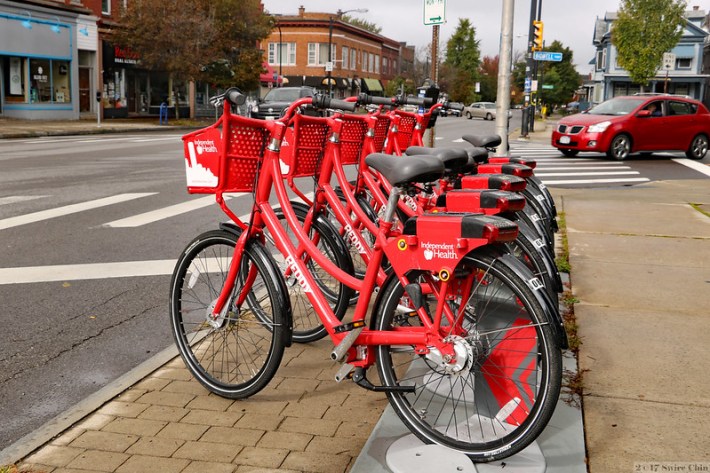Subsidies For Bike-Share Would Get Huge Bang For Small Bucks: Report
Little bucks for bigger bike-share?
Unlocking even a small fraction of New York’s multi-billion-dollar transit subsidy could provide a huge revenue stream for bike-share in the Empire State, argues a new report from the state Energy Research and Development Authority, which took a comprehensive look at how to integrate transit and cycling in New York’s cities and towns.
The report, Extending Transit: Completing New York’s First and Last Mile, specifically recommended that officials dip into the Statewide Mass Transportation Operating Assistance, a $3-billion fund that supports transit systems around the state, including the MTA. Doing so would most likely require a legislative change to classify bike-share as a form of public transit.
Taking as an example the bike-share program run by the Capital District Transportation Authority, the report’s authors applied the Statewide Mass Transportation Operating Assistance subsidy at the same rate that transit agencies get — .405 cents per passenger and .69 cents per revenue mile — to the Capital District bike-share program, which operates in Albany, Rensselaer, Saratoga and Schenectady.
As a result and based on its 2021 ridership, that system would receive $139,000 from the Statewide Mass Transportation Operating Assistance, providing a funding boost of more than 20 percent to its budget:

The relatively small amount of money would allow the bike-share system to expand geographically in the Capital region, the report said. It would also allow the system to expand by adding e-bikes and other micro-mobility options or supplement transit in areas where bus service is lacking relative to population. Bike-share systems cost less to run than other transit systems, while providing hundreds of thousands of rides and passenger milage, meaning that the additional dollars could go extremely far.
“We asked the question, ‘What if we treat bike share as it actually is, as a public transit system?’” said Dan Suraci, the author of the report. “The cost ratios are so different for bike share than they are for transit systems. It’s game-changing money at a very, very low, relative cost to the state.”
Five bike-share programs currently operate in the New York: The Capital District Physicians’ Health Plan system in the Capitol Region, Reddy Bike in Buffalo, Veo in Syracuse, Lime in Yonkers and, of course, Citi Bike in the capital of the world. The small size of the systems, excluding Citi Bike, makes them good candidates for Statewide Mass Transportation Operating Assistance money because the required subsidy would be so tiny compared to the overall size of the fund.
“This is a fractional percentage,” said Suraci. “It would not cost the state much to do it.”
Citi Bike, of course, is its own beast. There were 34,518,391 rides on the Big Apple system last year, totaling 54,158,139 miles. If Statewide Mass Transportation Operating Assistance were funneled to Citi Bike in the manner described in the report, the Lyft-owned system would get $51 million.
That’s a big number on its face, but it’s also only .017 percent of the $3 billion appropriated to the Statewide Mass Transportation Operating Assistance every year. New York City officials have resisted putting their own city money into Citi Bike, adding to the potential of the relatively small portion of state funding.

The report stopped short of making recommendations on how to distribute Statewide Mass Transportation Operating Assistance to bike-share programs around the state. But the result could massively upgrade bike share without really eating into or “competing” with transit systems, Suraci told Streetsblog.
“Bike-share is not a bus. But at the same time, it serves the same function on a smaller scale, and it provides connectivity to trains,” he said. “I don’t think we need to worry about competition, because bike-share and scooter-share [work] in tandem with transit, and they promote each other. And how many million dollars out of $3 billion? It’s a drop in the bucket.”
source https://nyc.streetsblog.org/2024/06/05/transit-subsidies-for-bike-share-would-get-huge-bang-for-small-bucks-report

Comments
Post a Comment